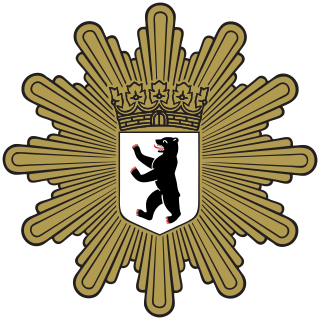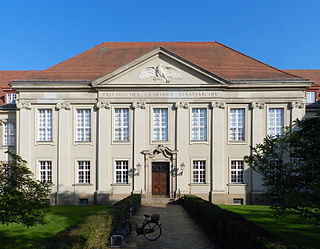
The Ministry for State Security, commonly known as the Stasi, was the state security service and secret police of East Germany from 1950 to 1990.

West Germany is the common English name for the Federal Republic of Germany from its formation on 23 May 1949 until its reunification with East Germany on 3 October 1990. It is sometimes known as the Bonn Republic after its capital city of Bonn. During the Cold War, the western portion of Germany and the associated territory of West Berlin were parts of the Western Bloc. West Germany was formed as a political entity during the Allied occupation of Germany after World War II, established from 12 states formed in the three Allied zones of occupation held by the United States, the United Kingdom, and France.

Schießbefehl was the term in the German Democratic Republic for standing orders authorizing the use of lethal force by the Border Troops to prevent Republikflucht (defection) at the Inner German border from 1960 to 1989.

The Federal Ministry of Finance, abbreviated BMF, is the cabinet-level finance ministry of Germany, with its seat at the Detlev-Rohwedder-Haus in Berlin and a secondary office in Bonn. The current Federal Minister of Finance is Christian Lindner (FDP).
The Federal Police is the national and principal federal law enforcement agency of the German Federal Government, being subordinate to the Federal Ministry of the Interior and Community. The Federal Police is primarily responsible for border protection and railroad and aviation/air security. In addition, the agency is responsible, among other tasks, for the protection of federal constitutional bodies. It provides the federal alert police and GSG 9 special police unit, which can also be used to support the federated states of Germany. Ordinary police forces, meanwhile, are under the administration of the individual German states (Bundesländer) and are known as the Landespolizei. In addition to the Federal Police, the Federal Criminal Police Office and the German Parliament Police exist as further police authorities at the federal level.
The German Democratic Republic was created as a socialist republic on 7 October 1949 and began to institute a government based on the government of the Soviet Union during the Stalin era. The equivalent of the Communist Party in East Germany was the Sozialistische Einheitspartei Deutschlands, which along with other parties, was part of the National Front of Democratic Germany. It was created in 1946 through the merger of the Communist Party of Germany (KPD) and the Social Democratic Party of Germany (SPD) in the Soviet Occupation Zone of Germany. Following German reunification, the SED was renamed the Party of Democratic Socialism (PDS), which eventually merged with the West German Electoral Alternative for Labor and Social Justice to form the modern Left Party.

The Federal Criminal Police Office of Germany is the federal investigative police agency of Germany, directly subordinated to the Federal Ministry of the Interior. It is headquartered in Wiesbaden, Hesse, and maintains major branch offices in Berlin and Meckenheim near Bonn. It has been headed by Holger Münch since December 2014.

Law enforcement in Germany is constitutionally vested solely with the states, which is one of the main features of the German political system.

The Federal Minister of Intra-German Relations was a federal cabinet minister of the Federal Republic of Germany. The office was created under the title of Federal Minister of All-German Affairs in 1949, being also in charge of the German lands east of the Oder–Neisse line which had been put under Polish or Soviet administration. In 1951, the first Minister of All-German Affairs Jakob Kaiser openly raised claim to even greater territories including Austria, parts of Switzerland, the Saar area and Alsace-Lorraine.

The Berlin Declaration of 5 June 1945 or the Declaration regarding the defeat of Germany, had the governments of the United States, the Soviet Union, the United Kingdom, and France, acting on behalf of the Allies of World War II, jointly assume de jure "supreme authority" over Germany after its military defeat and asserted the legitimacy of their joint determination of issues regarding its administration and boundaries prior to the forthcoming Potsdam Conference.

The Central Office of the State Justice Administrations for the Investigation of National Socialist Crimes is Germany's main agency responsible for investigating war crimes during Nazi rule. The commission possesses the largest collection of files, documentation and materials concerning criminal activities during Nazi rule. The Central Office is located in Ludwigsburg.

The Federal Agency for Civic Education is a German federal government agency responsible for promoting civic education. It is subordinated to the Federal Ministry of the Interior, Building and Community. Thomas Krüger has served as president of the agency since 2000. The modern agency was established in West Germany in 1952 by the Adenauer government to counteract communism during the Cold War, but it has its roots in earlier government agencies dating back to the First World War.

The Berlin Police is the Landespolizei force for the city-state of Berlin, Germany. Law enforcement in Germany is divided between federal and state (Land) agencies.

The Secret State Archives Prussian Cultural Heritage Foundation is an agency of the Prussian Cultural Heritage Foundation headquartered in Berlin, Germany. A Federal statutory body, it is one of the largest repositories of primary source documents in Germany and spans the history of Prussia, Brandenburg, the House of Hohenzollern and the Prussian Army. Insofar as the agency represents over 400 years of archival work of the former states of Brandenburg-Prussia, including their main roots in the Teutonic Knights, the Archives can be said to cover "nine centuries of European history between Königsberg and Cleves."

Berlin is a city-state and the capital of the Federal Republic of Germany.
The abolition of Prussia took place on 25 February 1947 through a decree of the Allied Control Council, the governing body of post-World War II occupied Germany and Austria. The rationale was that by doing away with the state that had been at the center of German militarism and reaction, it would be easier to preserve the peace and for Germany to develop democratically.

The Central Office for Information Technology in the Security Sector is a federal agency of the German government. Headquartered in Munich, it is subordinate to the Federal Ministry of the Interior, Building and Community. Its mission is to develop and research technical solutions, tools and methods for other government agencies.

The Gera Demands were a set of demands made by the East German leader Erich Honecker on 13 October 1980. Directed at the West German government, they called for far-reaching foreign policy concessions.














